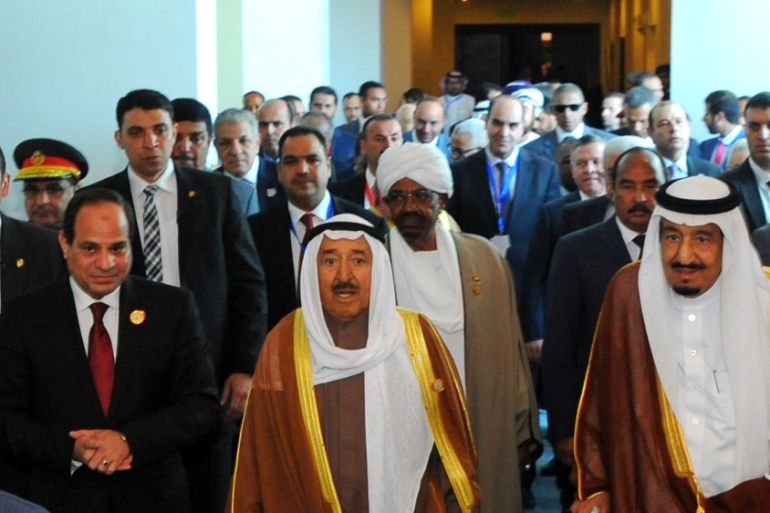Analysts: Gulf-Egypt ties likely to survive turbulence
Egypt and the Arab Gulf states’ mutual need for one another are expected to transcend recent incidents.

In recent months, the “special relationship” between Egypt and the Gulf Arab states has shown signs of faltering.
Earlier this month, Saudi Arabia’s ambassador to Egypt reportedly issued a formal complaint regarding the Egyptian media’s harsh criticisms of the Gulf kingdom.
Keep reading
list of 4 itemsQatar emir condemns ‘genocide’ in Gaza, urges ceasefire at GCC summit
‘Enduring commitment’: Key takeaways from US-GCC joint statement
Analysis: Efforts to end Assad isolation gather speed after quake
Saudi Ambassador Ahmed Kattan told Gulf satellite channel Khaleejna TV that there was “a lot of anger in the kingdom” after comments made by several anchors on private Egyptian satellite TV stations criticising King Salman bin Abdulaziz al-Saud’s government over regional policies, especially on military intervention in Yemen and Saudi’s stance on Egyptian-Russian relations.
King Salman came to power in January following the death of his half-brother King Abdullah, who was known for his strong support for Egypt.
RELATED: Egypt under Sisi: ‘No criticism accepted’
In February, a Turkey-based television station leaked what it claimed was a conversation in which Sisi asserted that Saudi Arabia, the United Arab Emirates, and Kuwait have much more financial resources than they actually need, and that Egypt should receive a cut of the money.
The three countries have provided large amounts of financial aid to Egypt since former Egyptian President Mohamed Morsi was ousted in July 2013.
Nevertheless, analysts say the Gulf-Egypt relationship is likely to remain intact. “Saudi Arabia’s support for President Abdel Fattah el-Sisi’s government had been virtually unconditional since Mohamed Morsi’s ouster,” said Fahad Nazer, a former political analyst at the Saudi Arabian embassy in the United States.
”The
have to realise that being in perfect lockstep during a time of unprecedented upheaval is unrealistic. A policy that declares, ‘you’re either with us or against us’ is untenable and is bound to be counterproductive.”]
Historically, Saudi Arabia has backed Egypt’s leaders despite their ideology.
It supported Egypt’s monarchy before pan-Arab nationalist Gamal Abdel Nasser took power in 1953, and supported Nasser as well, even after he turned against the Saudi royal family by backing nationalist Yemeni rebels whom the Saudis were against.
“King Faisal forgave Nasser [for supporting Yemeni rebels against the Saudis and Yemeni royals] because he understood that the Egyptian president was not a permanent fixture,” said Joseph Kechichian, a columnist for the United Arab Emirates’ Gulf News newspaper and a specialist on the Gulf countries’ relations. “Despite Sisi’s indiscretions, they still perceive him as a worthy ally. Riyadh views Cairo as a bulwark of Arab stability, despite serious leadership flaws,” Kechichian told Al Jazeera.
While Sisi’s Egypt has experienced good relations with Saudi Arabia, the UAE, Kuwait, Bahrain and Oman, the same cannot be said for Qatar.
Qatari-Egyptian ties reached a low point when Morsi was deposed by an army coup in July 2013. Qatar then repeatedly denounced Morsi’s removal and provided political asylum for many leaders of the Muslim Brotherhood after Egypt classified the group as a “terrorist” organisation.
Khalil al-Anani, an Egyptian writer and researcher, recently wrote that the Gulf-Egypt relationship benefits both sides. “The Gulf states, for their part, understand Sisi’s great need for them and their support, which kept his government alive during unprecedented economic deterioration.”
Khaled Diab, an Egyptian-Belgian journalist and blogger, noted that the Gulf states’ aid for Egypt is not “driven by altruism or Arab brotherliness”.
“To varying degrees, each country in the Gulf has been jockeying to gain as much influence as it can over an Egypt in major flux, in the hope it can shape post-revolutionary Egypt into its own image,” Diab told Al Jazeera.
Last November, Egypt, Saudi Arabia, the United Arab Emirates and Kuwait were reportedly discussing the creation of a military pact between Arab countries, with the possibility of forming a joint armed force to intervene around the Middle East.
In March, Sisi said that Arab leaders agreed to form a united military force to combat the “challenges” the region is facing. At the time, Egyptian officials said the proposed force would be made up of roughly 40,000 elite troops and backed by jets, warships, and light armour. The force would reportedly be stationed in Egypt or Saudi Arabia, and would likely be funded primarily by Gulf Arab states.
|
|
“The UAE, the Saudis, and the wider region depend on a stable Egypt,” said AbdulKhaleq Abdulla, a Dubai-based professor and political analyst. “It is a strategic effort for us [the UAE], and the country is profoundly connected to Egypt. The leadership has to work with whoever is in power, whether it was during Morsi’s rule, Mubarak or Sisi.”
Analysts say the Gulf states’ efforts to maintain good relations with Egypt is partly a reaction to the nuclear deal between Iran and major world powers. The deal, reached in April between Iran on one side and China, Russia, France, Great Britain, Germany and the US on the other, offers Iran more than $110bn a year in sanctions relief and a return to the global economy in exchange for halting its drive for a nuclear weapon.
“GCC leaders believe Iran is a destabilising force in the region – and it has every right to, given recent events in the region,” explained Abdulla. “It will remain a destabilising force, and even probably more so, if economic sanctions are to be lifted in the future.”
Nazer, the former Saudi diplomat in the US, said that despite recent “rough patches” between Egypt and the GCC, both sides will have to maintain a cordial relationship due to the region’s deteriorating security.
“The two [sides] have to realise that being in perfect lockstep during a time of unprecedented upheaval is unrealistic,” said Nazer. “A policy that declares, ‘you’re either with us or against us’ is untenable and is bound to be counterproductive.”